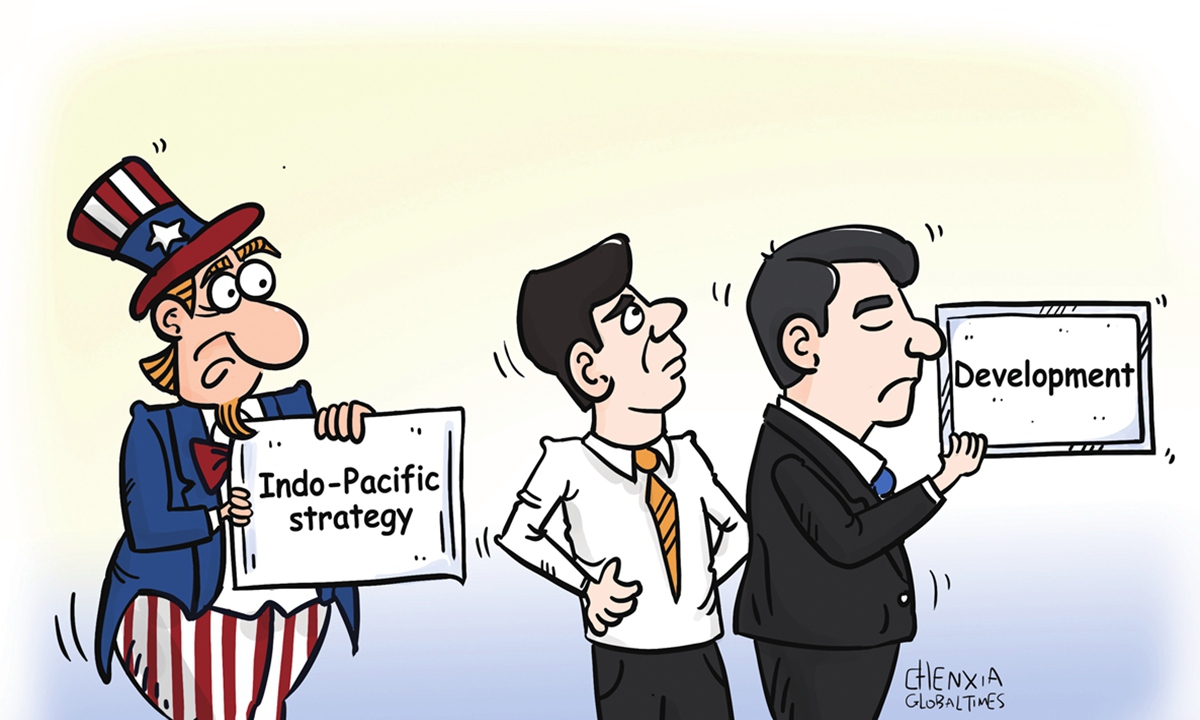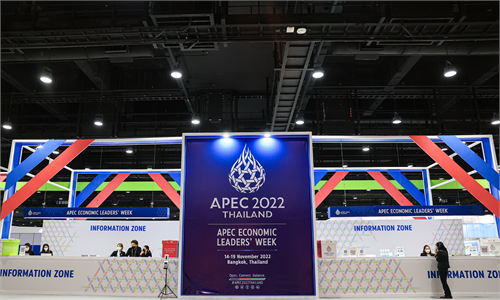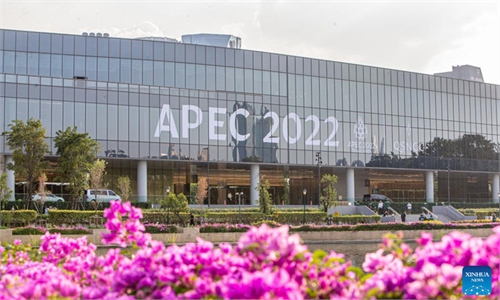Influence in Asia-Pacific does not come via coercion

Illustration: Chen Xia/GT
US President Joe Biden will be absent on Friday at the APEC Economic Leaders' Meeting held in Bangkok, Thailand. He returned home directly after the G20 summit in Bali, Indonesia, to attend his granddaughter's wedding. Such an arrangement would generally be understandable in Western culture, but the discussion has emerged in media outlets, such as the Voice of America, fearing that Biden's absence means the US is giving away its chance to win the Asia-Pacific region to China. Because of such worries, Vice President Kamala Harris, who will attend the APEC meeting instead of Biden, will focus on telling Asia-Pacific countries and companies that there is no better partner than the US.It's funny how Biden skipping one meeting for understandable personal reasons can raise such serious concerns. This can only mean that this kind of worry has long existed, and it was brought to light only with Biden's absence.
On a closer look, such a fear comes from a very traditional, low-level jealousy and precaution and is based an outdated view of the Asia-Pacific. The region has long become a large market full of integration and opportunities, with its internal logic being a combination of globalization factors. But the US is still searching for a main thread of geopolitics in a far-fetched way and trying to use traditional geopolitical tools to reorganize the Asia-Pacific region in its own favor. However, it has become increasingly strenuous for Washington to do so because it is simply not strong enough to reverse the trend of development in the region.
Business and trade has gradually become the biggest driver of various new constructions in the Asia-Pacific region, and economic development has become the most important perspective from which each stakeholder considers its security. In other words, for regional countries, national security is now first and foremost about the security of their own sustainable economic development. Since China provides the largest external opportunity and resources for these countries to maintain their economic development, countries in the Asia-Pacific nations can use them without any worry. They can fully connect their own advantages with the resources China provides, without paying for political costs.
China is gradually gaining influence in the Asia-Pacific region. This process is also very easy and natural, because China is trying very hard to develop itself while opening its doors and cooperating with any country it can without setting political conditions. Therefore, expanding economic cooperation with other countries is in harmony with China's own development. We have not put any particular effort into it, nor have we made any deliberate plan from a geopolitical perspective. It can even be said that China has not deliberately sought to expand its influence, but they are naturally formed.
China is the biggest trading partner of almost all ASEAN members, as well as major US allies in the Asia-Pacific region, including Japan, South Korea, and Australia. South Korea's trade volume with China in 2021 almost equaled the sum of its trade with the US, Japan and the EU, and the value of Vietnam's imports from China in 2020 exceeds the number of the US, Japan, and Germany combined. China respects ASEAN and has always supported ASEAN's important role in regional cooperation. We participate in ASEAN+ with ASEAN at its center. The Regional Comprehensive Economic Partnership was also initiated by ASEAN.
The problem for the US is that its resources which are most attractive to the Asia-Pacific are decreasing, and it is using high-quality resources as leverage to seek its own interests and even coerce Asia-Pacific countries and regions. The trade share of the US in the Asia-Pacific region has undoubtedly reduced, and it does not have the technological advantages it had in the past. Take chips. It has basic technological advantages, but its manufacturing capacity has been lost to Taiwan and South Korea. It started to mess around, first creating the Trans-Pacific Partnership agreement centered on itself, then abandoning it, and then creating an Indo-Pacific Economic Framework for Prosperity. The logic of actions is very confusing.
Originally, the advantage of the US lied in technology, and its popularity in investing in the Asia-Pacific region has become one of the greatest levers of its influence. But since the Trump administration, the US has emphasized "the return of manufacturing," and the Biden administration has forced Taiwan's and South Korean companies to set up chip factories in the US for the sake of the US' chip security. These actions are generally aimed at cutting off some ties of US influence in the Asia-Pacific and poaching its own corner.
The economic influence of the US in the Asia-Pacific region depends on its own economic strength and spillover capabilities. This includes the continuous expansion of the US domestic market to provide more market opportunities for Asia-Pacific countries, as well as the investment of US companies to bring high-tech and capital to the Asia-Pacific region. The US must remain a thriving, vibrant economy to keep expanding its appeal. True influence comes naturally, not through geopolitical coercion, like puffing a small handful of corn kernels into a large bag of popcorn.
Therefore, whether the US is the best partner of the Asia-Pacific region, it is not dependent on what Vice President Kamala Harris will say at the APEC meeting; rather, all countries in this region have a steelyard in their hearts. The real scale on the steelyard is the technology, capital and market support that the US provides to the region, not the language Harris uses. Everyone knows what kind of geopolitical goals the US harbors in the Asia-Pacific region, but is at a loss as to what tangible benefits the US can bring to the region.
The author is a commentator with the Global Times. opinion@globaltimes.com.cn




